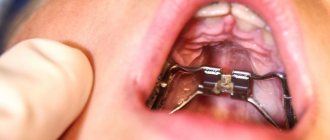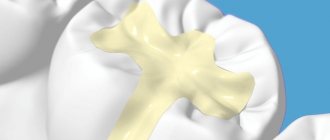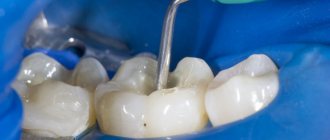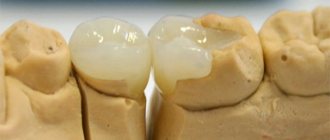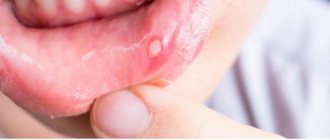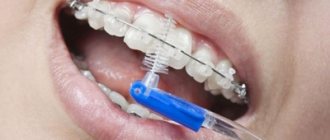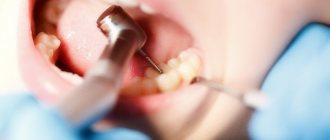When pressing on a filled tooth, pain is felt, why? After visiting the dentist, pain in the tooth that was treated is a natural occurrence. Hence the question: is it worth going to the doctor, or maybe you can be patient a little and the discomfort will disappear? If this pain intensifies or continues for a long period of time, then, of course, you need to consult your doctor.
A filling was placed, but the tooth hurts when pressed
Why does a tooth hurt after a filling is installed?
Many patients complain about this problem. The treated part hurts, and when you press on it, discomfort appears. If this problem is ignored, inflammation develops, as a result of which the tooth can deteriorate and collapse. After treatment, the tooth may and should hurt for some time. This is not a cause for concern because the dentist used instruments that impact both hard and soft tissue.
For some time after treatment, the tooth hurts due to the impact of the dentist’s instruments on the tissue.
When a tooth hurts precisely when chewing food and pressing on it, this may mean that:
- the filling is made too high (the dentist generously used filling material);
- the solution could shrink more after hardening or it might not be enough;
- the procedure was carried out in violation of the rules;
- the canals are inflamed;
- dental canals become infected (negligent handling of instruments);
- the filling solution is of poor quality;
- an allergic reaction appeared;
- misdiagnosed.
If the tooth hurts when pressing on it or when chewing food, the filling may have been placed incorrectly.
Video - If a tooth hurts after filling
How long can you walk without a filling and what to do if it falls out?
You need to make an appointment with a doctor as soon as possible. This is especially true if the tooth hurts after the filling has fallen out. If you still cannot visit the office, you should follow a number of simple rules before doing so. This will help minimize harm and avoid complications.
- Do not put pressure on the tooth or chew hard foods on it.
- It is better not to chew on a damaged tooth at all.
- The oral cavity can be rinsed with chamomile decoction, soda and saline solutions at a comfortable temperature.
- Be extremely careful when brushing your teeth, do not put a toothpick or other sharp objects into the hole.
During the examination, the dentist will determine the cause of the problem and will be able to eliminate the problem as quickly as possible.
Filling too big
In the first situation, discomfort is noted, since the treated tooth is higher than other teeth. It is impossible to squeeze the jaw tightly, and when biting hard food, the filling puts pressure on the root system and nerve endings, which is why it hurts. Excessive filling material can cause the development of periodontitis if the material ends up behind the roots of the teeth.
Filling too big
Filling too small
When the doctor uses insufficient quantities of material and makes the filling quite small, then some food debris or liquid, or maybe just air, gets in during eating. All this will cause even more discomfort. Caries and inflammation may also develop.
If the filling is too small, food debris, liquid or air gets in, and an inflammatory process may begin.
Low work experience
Incompetence is also the result of trouble. The dentist may not dry or overdry the surface on which the filling is attached. When the nerves become too dry, they become damaged or may even disappear. The filling will lie loosely and unevenly if not dried enough, causing small holes to form, but they will cause a lot of discomfort.
The competence and experience of the dentist play an important role
Actions that a doctor should take before treating a tooth:
- remove remnants of a former filling or caries;
- rinse the cavity;
- dry with a special device;
- clean the dental canals;
- remove nerves (at the patient’s request);
- dry the dental canals;
- seal each channel one by one;
- dry the cavity;
- install a temporary or permanent filling (this depends on how damaged the tooth is);
- adjust the filling according to the bite.
Dental treatment
It also happens that the doctor cured a neighboring tooth. This is an extremely rare situation, but anything is possible. To check whether the correct tooth has been treated, you need to make tapping movements on other teeth with a metal object. If pain is felt, then you need to head to the dental office.
If pain occurs when tapping on a tooth, you should consult a dentist.
It is necessary to make a correction. Changes in bite, curvature and injury to the roots of the teeth are guaranteed. The natural edges of the tooth may crack and crumble due to the high pressure.
Why do they fall out?
There are many reasons for loss. But all of them can be divided into two main categories: due to the fault of the doctor and due to the fault of the patient.
The first category includes:
- Medical errors and insufficient qualifications of the doctor. This leads to the wrong choice of treatment method, non-compliance with installation technology, and the use of inappropriate materials. As a result, the patient is faced with a filling falling out, the tooth hurts, and the person does not know what to do;
- Poor quality filling materials. They are poorly secured in the tooth cavity and crumble over time, which leads to loss of the filling;
- Wrong method of treatment. If the filling is installed in a tooth that is heavily damaged by caries and has thinned walls, or is not formed tightly enough, it will most likely fall out;
- No one is immune from medical errors. Therefore, take your choice of doctor very seriously. Choose a dentist with a good reputation and a clinic that guarantees quality service.
The second category is the loss of a filling due to the patient’s fault:
- Poor care and non-compliance with hygiene rules, resulting in caries;
- The presence of diseases of the teeth and oral cavity: periodontal disease, pulpitis, stone deposition and others;
- Bad habits of gnawing nuts and seeds, constantly chewing gum, biting threads, opening something with your mouth;
- Mechanical impact or injury;
- Very fragile tissue due to various reasons: heredity, lack of microelements, past diseases.
In these cases, careful attention to your health plays a decisive role. How long your fillings will last depends only on you.
A filling fell out: what to do before seeing a doctor?
If trouble occurs, then the most reasonable thing is to visit the dental clinic without delay, and not to search for a solution on how to fill the hole when the filling has fallen out. But it happens that qualified medical care is not available. The trouble happened on the weekend, in an area where there are no clinics, and so on. The situation is complicated by pain, which only gets worse over time.
- Calm down and understand that you cannot solve this problem on your own. Don't hesitate to make an appointment with your doctor. The sooner you get to him, the better. It will be possible to save the tooth and avoid complications;
- Carefully clean and rinse the mouth with a disinfectant solution;
- Take a pain reliever if you experience severe pain;
- Do not touch the diseased area, do not put “medicinal” products there: tablets, a clove of garlic, and so on;
- After every meal, be sure to rinse your mouth.
Temporary remedies
Temporary filling is used in several cases:
- When substances that paralyze the nerve are placed in the tooth cavity. To keep these substances inside and prevent food from getting in, the holes are sealed with a special compound.
- When they treat the canals and put in drugs that fight the infection inside them, so that the medicine remains there and is sure to work.
- When the treatment process is complex and several visits to the doctor are necessary, the open and prepared tooth with filled canals is closed with a temporary composition.
If a temporary filling falls out, you need to do the following:
- Do not load the affected area, protect it from food;
- Rinse your mouth and do this as often as possible;
- If a temporary filling falls out of a tooth in which the canals are filled, the main task is to protect them from infection. To do this, it is necessary to close the open cavity of the tooth. You can carefully cover it with a piece of cotton wool moistened with a disinfectant;
- Don't put off visiting the dentist. Otherwise, you risk negating all efforts to treat the tooth and losing it.
What you shouldn’t do if you don’t have a temporary solution:
- Picking an open tooth;
- Eating very cold and very hot food;
- Try to fill the cavity with improvised means, even if you come across advice about installing a filling yourself using special medical material purchased from an online store. By trying to seal a tooth cavity, you risk introducing an infection into it and getting complications.
Read also: How soon can you eat after brushing your teeth?
If your tooth hurts
The most unpleasant situation is when, as a result of tooth loss, the tooth hurts unbearably.
In this case, in order to quickly relieve pain, you can do the following:
- Taking painkillers;
- Rinsing with a solution: salt and soda in equal quantities, infusion of chamomile, calendula, sage;
- Rinse or apply with a solution of novocaine 10%;
- Do not delay dental treatment and consult a doctor as soon as possible. It will relieve pain and eliminate its cause.
Before seeing a doctor, of course, try to calm the pain.
To do this, rinse your mouth as often as possible with a warm solution. Keep your feet warm, but do not apply heat to your cheek. Try to avoid drafts and noisy places. If possible, get some sleep.
Prevention
The problems described above can be avoided.
To do this, you should always adhere to several rules:
- Choose your dentist carefully. If the quality of treatment does not suit you, then refuse the services of this doctor;
- Strictly follow all the dentist’s instructions;
- Give up the bad habit of gnawing hard objects;
- Maintain good oral hygiene;
- Carry out preventive examinations regularly.
Take care of your teeth, look after them. And may they be healthy!
Infection in the dental canals
Inflammation of the canals is another reason why the tooth hurts when pressed. Dentists offer to remove a nerve to a patient quite rarely. Of course, you want to save the tooth, but no one wants to endure unpleasant pain. Before starting, the doctor needs to remove the old filling and clean the canals. They come in different diameters and the doctor uses spiral-shaped needles to expand them. The channels are cleaned and disinfected. The material is dried and filled. When the dental canals are poorly cleaned and poorly closed, then an infection develops.
Channel cleaning
Inflammation can develop diseases such as:
- flux (this is swelling of soft tissues. Body temperature rises, weakness and malaise appear. The dental surgeon will eliminate the pathology);
- pulpitis (this is an inflammation of the internal tissues of the tooth. The tissues consist of nerves, blood vessels and connective tissue);
- purulent process (dangerous because the likelihood of meningitis is high. The brain may be exposed to pus from the oral cavity).
The process of pulpitis
Allergy
One fourth of the population is susceptible to allergic reactions. Low-quality material from manufacturers from China, which the doctor uses for sealing, can cause allergic reactions.
Signs may include:
- edema;
- the appearance of tearing;
- discharge from the nasal cavity;
- attacks of suffocation.
An allergic reaction to a poor-quality filling can be suffocation
If these signs appear, contact your dentist immediately!
You need to know: there are situations in which the tooth aches due to the inattention of the victim. The attending physician should warn that after the procedure you should not consume food or liquids for several hours. A photopolymer filling, which petrifies under the influence of a curing lamp, is an exception.
Avoiding solid foods (carrots, meat, crackers, cucumbers) will help prevent pain. Also, when brushing your teeth, you should be careful and not press too hard with the brush.
When brushing your tooth, you need to be careful not to press too hard on the sealed tooth.
If you don't see a dentist on time
destruction of the filling if you do not contact the dentist in time
Many patients do not understand that untimely visit to the dentist for toothache after having a filling installed can lead to very sad consequences. Most often, inflammatory processes begin to develop, which affect not only neighboring teeth and destroy them, but also the gums.
In these cases, it is simply impossible to do without the help of a maxillofacial surgeon and radical intervention, which is associated with additional pain and more serious financial investments in treatment.
Thus, if you have a severe toothache after treating pulpitis when biting, you should immediately contact your dentist for help, because ignoring such simple rules leads to serious consequences and complications.
Unbearable pain
Pain is not ignored if:
- edema and swelling appeared (not subside for more than 3 days);
- there is an abscess in the mouth;
- body temperature increased;
- headaches appeared;
- there is no way to close the teeth - the filling is in the way;
- formation of gaps between the filling and the tooth is observed.
If your health worsens (swelling, headaches, fever), you should immediately consult a doctor.
If at least one of these symptoms is observed, then you cannot self-medicate.
7 reasons to visit a doctor if you have these symptoms
| Symptoms | Photo |
| The intensity of post-filling pain does not stop within 3 days | |
| The temperature rose above 38.5°C after tooth filling | |
| The gums near the filled tooth are inflamed | |
| The appearance of a tumor on the cheek from the side of the diseased tooth | |
| When pressing on a tooth, the aching pain turns into acute | |
| Pain occurs when swallowing and chewing food | |
| There was an unpleasant purulent odor from the mouth |
What happened
The filling has fallen out, who is to blame for this? The answers to this question can be very different. There are three factors that determine the strength of the restored tooth.
Why do fillings fall out?
- Due to the fault of the doctor conducting the treatment. In this case, when carrying out his actions, the specialist made some mistake.
If all carious tissues have been poorly cleaned, then a secondary process occurs. It develops over a very short time. If healthy tissue is damaged, the material cannot stand firmly in its proper place. It falls out while eating or brushing your teeth. After the incident, the person sees a rather large cavity, which is surrounded by a dark color. Some doctors make mistakes when treating caries and restore a tooth without first treating pulpitis and periodontitis. In this case, even if the filling material remains in the same place, unbearable pain appears. When the patient contacts, the doctor will take an x-ray and understand his guilt. In this case, it will be necessary to completely get rid of the seal and carry out your work efficiently.
The second common mistake a dentist makes is the incorrect formation of a cavity and ledge during caries treatment. If you do not take into account some factors, the filling material will not adhere well and will fall out at the first opportunity. During restoration, the following necessary requirements are observed: high-quality antiseptic treatment is carried out, the tissue is etched well, and the cavity is completely dried. Success directly depends on the quality of the filling materials themselves and the lamp, which helps to carry out bonding reactions;
- Trouble can happen through the fault of the patient himself. Some people chew seeds and nuts without using special tools. They believe that dental units are strong enough and are specially designed for these purposes. However, this is completely unacceptable.
It is strictly forbidden to: chew bones and pieces of ice; you should also not use chewing gum for a long time. Often people do not properly care for their oral cavity and do not follow the basic recommendations of specialists; this becomes the main reason for the development of diseases.
Remember! All diseased teeth should be treated, and not just those with significant destruction. Oral caries is a source of constant infection.
Read also: The best filling for a tooth
In most cases, the processes proceed secretly and do not cause any trouble. However, the lesions must be sanitized in order to prevent the spread of pathology to healthy teeth. If the process is not stopped, then even treated units are affected by caries again. As a result, the filling may fall out and the tooth may ache. An accident may occur if mechanical damage occurs. For example, a person got into a fight and was hit in the face.
- For natural reasons, fillings fall out much less frequently.
Features of materials. Composites have the ability to shrink slightly. Therefore, several years later, after caries treatment, it will be necessary to carry out restoration. Great tissue destruction. After the unit is restored, there is a high probability that in the near future, the fragile wall will break. It will fall out under any, even minor, mechanical impact. In such cases, upon completion of his work, the dentist-therapist gives recommendations for further prosthetics. By covering the unit in time with a protective cap - a crown, you can save the tooth. The prosthetic procedure is carried out even with significant damage to the coronal part. For restoration, special pins and inlays are used.
Cervical caries is very difficult to treat. Very often the filling material falls out, and patients come with numerous complaints. But here the natural factor is more to blame, and not the dentist himself. The fact is that the affected cavity is located near the gum. It is very difficult to properly dry the surface during treatment. For filling, it is necessary to use special modern materials, which are not available in all clinics. State medical organizations with meager provision have a particularly disadvantageous position in this case.
Medications
A number of drugs can be used as pain relievers.
| A drug | Dosage | Duration |
| 1 tablet every 6 hours | no more than 3 days |
| 1 tablet 2 times a day | no more than 3 days |
| 1 tablet 3 times a day | no more than 3 days |
| "Ibuprofen" | 400 mg 4 times a day | no more than 3 days |
| "Nurofen" | 1 tablet 3 times a day | no more than 3 days |
It is important to read the instructions for the drug, studying the side effects and possible allergic reactions!
Can I take medications?
With severe pain syndromes, many rush to take antibiotics and anti-inflammatory drugs, for example, Nimesil, but taking medications without a doctor’s prescription is fraught with serious consequences. Antibacterial therapy will only temporarily eliminate the source of infection.
For example, the same Nimesil is an effective anti-inflammatory drug. But it is used in dentistry only when the dead tooth has been filled correctly, and it is not advisable to open it. Taking Nimesil is justified only in extreme cases, since the medication has a lot of contraindications and side effects.
Read also: What is arsenic used for?
You should not delay visiting the dentist and treat the disease with self-selected medications. If you need to remove a tooth to get rid of pain, pills will not save the situation.
How to alleviate your condition after filling?
Irritating factors can be reduced:
- not drinking too hot or cold drinks;
- giving up smoking;
- rinsing your mouth with herbal decoctions or whatever your dentist recommends;
- using ointments as a pain reliever (also based on the doctor’s advice!).
Use pain-relieving ointments or rinse your mouth with herbs only on the recommendation of a dentist
You need to visit the dentist's office approximately once every six months. Thanks to this, you can avoid many hidden diseases and also keep your teeth in excellent condition. Read our article about how long your gums hurt after tooth extraction.
